| Reviews & Columns |
|
Reviews DVD TV on DVD Blu-ray 4K UHD International DVDs In Theaters Reviews by Studio Video Games Features Collector Series DVDs Easter Egg Database Interviews DVD Talk Radio Feature Articles Columns Anime Talk DVD Savant Horror DVDs The M.O.D. Squad Art House HD Talk Silent DVD
|
DVD Talk Forum |
|
|
| Resources |
|
DVD Price Search Customer Service #'s RCE Info Links |
|
Columns
|
|
|
Cleopatra: 75th Anniversary Edition
Universal // Unrated // April 7, 2009
List Price: $29.98 [Buy now and save at Amazon]
The Film:
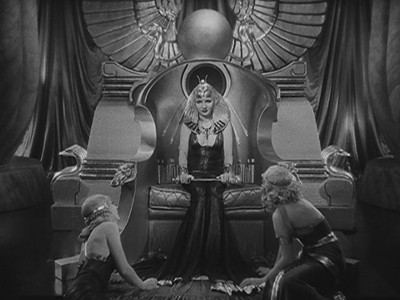 Though we've seen several strong on-screen projections of many dynamic historical figures, Cleopatra's story is one that's evaded an ideal translation. Cecil B. DeMille's Cleopatra, a grand and flashy exercise in production brilliance with Claudette Colbert in a non-stereotypical role, comes the closest.
Though we've seen several strong on-screen projections of many dynamic historical figures, Cleopatra's story is one that's evaded an ideal translation. Cecil B. DeMille's Cleopatra, a grand and flashy exercise in production brilliance with Claudette Colbert in a non-stereotypical role, comes the closest.
When Elizabeth Taylor captured attention with her lavish projection as the Queen of the Nile in the '63 rehash of the story, she projected the character with leftover spunk carried over from her Cat on a Hot Tin Roof performance -- but didn't quite sell getting the viewer's attention in the way all the stunning cinematography and production design would've hoped. Even with a massive runtime, an infinitely escalating budget, and the essence of C.B. DeMille as a blueprint, it still couldn't step above being merely a spectacle of production design. Whether it was the emergence of firm concentration on women's right around the time or the director's sheer prowess as both a director and a circus ring leader of sorts, DeMille's Cleopatra still remains the best telling of the Egyptian queen's sultry chess game with Roman figures.
Taking place around 30 BC, a significant date in history, we follow Cleopatra's maneuverings as she worms into the heart of Julius Caesar by stroking his ego and indulging in his temptations -- all in a ruse to keep her installed as the ruler of Egypt in the midst of Roman civil war. Though she seems to be acting solely in Egypt's interest, there's no doubt that she's drawn to these powerful figures and, in most cases, allows emotional investment to also come into the picture. The successes of her power play for Egypt's longevity, however, begin to fritter away once Caesar falls in the Senate. She then must gather her composure and perform some on-the-spot thinking to keep herself poised in the center of boisterous, war-fueled Romans, those eager to purge their beloved network of feminine wiles and any other outside forces desiring to mingle within their infrastructure. Instead, she kills them with kindness, luring the likes of iconic lover Marc Antony under her whims as she struggles for the endurance of the Egyptian people amid political transition.
Likely, it's the substance of Cleopatra's nature that has withered some of the character's intrigue in cinema over the years. Though she's an empowered soul, she grabs a hold of feminine lures in order to get what she wants. Certainly, that has all but disappeared from modern culture, right? Wink, wink. Drink, dance, and riches are the tools of her manipulation, along with well-placed seductive glances from the corners of her deeply-shadowed eyes -- something directors like DeMille take artistic license with, but likely wasn't far off in the actual figure's repertoire of tactics. Her simple manipulators, however, also illustrate a paradigm difference between male-driven society and Egyptian culture during the time period, as well as showcase Cleopatra's intelligence through seemingly simple-minded, sex-fueled whims. It's an odd balancing act, as it communicates a skewed message: she's playing a smart game, yet also playing it with carnal motivators.
DeMille, completely in his element, knows exactly where to focus attention regarding this power structure, and does so magnificently with Claudette Colbert. Occurring the same year as her unexpected Best Actress win for It Happened One Night, she adds a slightly quirky allure to the character that makes it nearly impossible for the audience to resist her charm. She makes her wooing advances an entertaining, pleasant thing to watch, never dipping too far into vaudeville-inspired cheekiness to detract from the scene but never taking it too seriously to make it feel stiff. There's a certain "eat, drink, and be merry" demeanor about her whims that could get lost in trying to give the film a dramatic poise, but not in DeMille's hands. Colbert's stunning to watch as Cleopatra, both in her dramatic scenes and in her lighthearted moments.
She's almost the most stunning thing about the whole shebang, coming in right behind DeMille's signature lavish production concepts. Victor Milner won an Oscar for his cinematography in '34 for Cleopatra, and rightfully so; a big part of soaking in the film is rooted in bouncing the audience's attention from one stunning element to the next. The art deco set design in particular is enough to make modern designers quake in their boots, showcasing both lavishness and attention to detail in a way that bombards the viewer with intricate Egyptian and Roman design elements without feeling too overdone.
Intricate costume designs etch out its signature personality even further, especially Travis Banton's work draped over Cleopatra herself. Though her gold-encrusted gowns and headdresses are awe-inspiring, it's the incorporation of jet black into the grayscale image that really trumpets visual allure. But, more than that, her costumes are also surprisingly risqué for the time period, projecting designs that accentuate her form in ways that stay truthful to the open-airiness about Egyptian attire and remaining, just a pinch, on the provocative side. Claudette wears these garments with so much authenticity and gravitas that it really makes us grasp how she'd be able to swoon her way into grasping victory in testosterone-powered political endeavors.
As to be expected, Colbert's initial scene as Cleopatra wooing Marc Antony is a stunner. It's in this that DeMille almost works as the ring leader in a circus instead of as a legendary director. Before the eyes of two alcohol-infused and starkly different historical figures in the midst of a power play, he parades a pack of women mimicking the movements of cats and a stalwart pair of chiseled assistants supporting their dining table on their shoulders. It's a lengthy scene, one that aims to put both the audience in Marc Antony's seat as his metaphorical armor comes crashing down via an onslaught of jewels, maidens, and ego-stroking from one of the world's most powerful women. And it works.
Herein lays the challenge. Cleopatra has three focal points: the character herself, the lavishness revolving around her presence, and the men in her life swooned by her magnetism. It seems like each director that tries to tackle the story doesn't really know what to do with all-powerful yet easily-swooned men, and DeMille's Cleopatra is no exception -- though they're handled well enough to hold concentration. Essentially, they're lowered to the levels of pawns underneath Cleopatra's fingertips, which make it difficult to really buy into them being strong individuals since the entire story swings on their manipulation. Warren William and Henry Wilcoxon both present Caesar and Marc Antony with the right sort of gusto while upstaging other men, yet they both skew towards awkwardness once their temptress enters the room. As with most things revolving around DeMille's cinematic eye, both are visual spitting images to historical depictions (especially Warren William, who appears to be a near spitting image of Caesar) even if their projections aren't quite there.
Be that as it may, Cleopatra embodies the director's spectacular screen presence -- something that escalates further as treachery, war, and spurned love seep into the picture -- in a way that greatly overshadows its stumbles to become an enduring portrait of an oft-misrepresented historical figure. In the tradition of some of his more prolific works such as Ten Commandments or The King of Kings, firmly rooted in excellence with historical epics, it becomes an event picture that truly understands the mentality revolving around ancient extravagance. Cleopatra, more than anything, knew how to push buttons to get what she needed for herself and the country of Egypt, whether it be through matters of wealth or matters of the heart -- or both. DeMille's brassy style fits this attitude like a glove, which builds into a stunning film experience that hugely entertaining to behold. Is it a step-for-step mirror of Cleopatra's history? Nah, not really, but in DeMille's hands ... who cares?
The DVD:
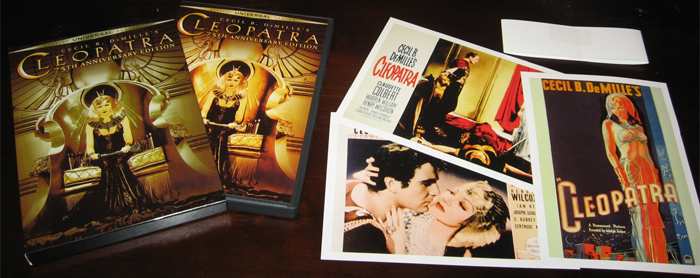
As an entry into Universal's Backlot Series, Cleopatra comes in a standard keepcase presentation with a sturdy, shiny cardboard slipcover holding the case. Inside, you'll find three lobby cards printed with classic posters for the film.
Video and Audio:
Preserved by the UCLA Film and Televison Archive, Universal's transfer for Cleopatra wears its age extremely well -- though clearly evident. Plenty of print damage can clearly be seen in the film's 1.33:1 full-frame presentation, both in minute scratches and in full-length line damage, as well as compression artifacts that give it a processed look. Some blooming can also be seen against stark whites, as well as some edge enhancement lines that crop up in scenes dense with texture. However, that's just part of dealing with some older prints; when it comes to depth, dimensionality, and overall contrast levels, the image looks rather good.
Grayscale linearization is handled well, opening the door for some rather strong details to pop from the image. And, boy, there's a load of minute elements to soak in. As yapped about in the film review, the production design and costume work here is an intricate array of decadence. Little points, like the slight glistening on Cleopatra's metallic headdresses and the shifting sheen against beautiful statues of both Roman and Egyptian origin, showcase both the print and the transfer's highest qualities. Even distanced elements can be cleanly seen in many sequences, like the statues at the end of the dense hallway behind Marc Antony as he enters Cleopatra's lair. It's certainly not a perfect transfer or an ideal print to replicate, but it's a very pleasant and enjoyable presentation that does justice to DeMille's visual extravagance. It's worth noting that the title cards at the beginning of the film are windowboxed.
Defaulting to a two-channel sound design, the Mono track has its period-placed issues here and there -- but largely sounds decent enough. Verbal clarity doesn't really waver, though it does push on the shelves with a bit of a rasp like many tracks of its time. Musical accompaniment also sounds fine, though sporting some of the same issues as the dialogue. However, no obtrusive blips or distortions could be detected, certainly not enough to derail enjoyment of the film. It serves its purpose, remaining audible and matching well with the image. A Spanish 2.0 track is also available, along with subtitles in both English, Spanish, and French.
Special Features:
Commentary with Filmmaker F.X. Feeney:
Staying focused and highly insightful, F.X. Feenery offers a well-spaced commentary that focuses mostly on filmmaking aspects. He discusses transitions, the usage of "plain" language to make the character's human, and DeMille's focus on sensuality and fiery women as the perfect fit for Cleopatra. His content is, in gereal, very strong, but Feeney's at his most insightful during the pinnacle scene with Cleopatra and Marc Antony.
Claudette Colbert: Queen of the Silver Screen (9:16, 3x2):
Featuring interviews with several film historians and writers as well as splicing in footage from some of her other films, this featurette gives us the bones, bits, and pieces of Claudette Colbert's relationship with movies, with DeMille, and with 1934 as the year that would become one of the best of her career. It discusses her roles in DeMille's other productions, along with why her on-screen presence is so demanding of attention. Though a little praise-heavy and a bit short, the experts' nuggets of information and the infusing of archival footage and stillshots are worth the time.
C.B. DeMille: Hollywood's Epic Director (10:03, 3x2):
Along the same lines as the Colbert featurette, this one covers C.B. DeMille's career as it transitioned from the Silent to the Production Code era. It discusses how he projects the stereotypical director with megaphone and seat on-set, his dated work in the '20s, and his transition to talkies around the shift. Like the first featurette, it's a bit of a backslapper but still very worthwhile for the content that inks through from the experts.
Production Code Era (9:47, 3x2):
For those inundated to the Production Code or "Pre-Code" Hollywood, this is a nice overview of how it came to pass. It covers how individual states had different censorship issues and how they combated the situation with a central editing board, a move that was more fueled by monetary losses than on the content displayed. It discusses how it applies to the Depression as well, which is pretty interesting, as well as how directors like DeMille got around code issues.
Rounding out the supplemental material is a Theatrical Trailer (4:16, 3x2) that likely shows the condition of some of the print elements before UCLA Film Archive's preservation.
Final Thoughts:
As a lover of ancient Egyptian culture and concepts, it'd be near impossible for me to not appreciate Cleopatra on at least some level. However, that's actually a pretty small element to the film itself, whereas Claudette Colbert's outstanding stage presence and DeMille's intoxicating eye for visual mastery within the collision of Egyptian and Roman elements stand out much more. It comes together into an amazing spectacle of cinematography prowess and entertaining theatrics, showcasing the director's creative tricks around the Production Code era as involving and enjoyable elements. To this day, it's still the most pleasing concoction of Cleopatra's story -- though Hollywood's certainly ready for another entry with a bit of modern Hollywood polish. Universal's Backlot Series edition of Cleopatra presents the material with highly watchable visual and sound qualities, as well as a nice commentary and roster of featurettes to enjoy afterwards. Highly Recommended.
Thomas Spurlin, Staff Reviewer -- DVDTalk Reviews | Personal Blog/Site
 Though we've seen several strong on-screen projections of many dynamic historical figures, Cleopatra's story is one that's evaded an ideal translation. Cecil B. DeMille's Cleopatra, a grand and flashy exercise in production brilliance with Claudette Colbert in a non-stereotypical role, comes the closest.
Though we've seen several strong on-screen projections of many dynamic historical figures, Cleopatra's story is one that's evaded an ideal translation. Cecil B. DeMille's Cleopatra, a grand and flashy exercise in production brilliance with Claudette Colbert in a non-stereotypical role, comes the closest. When Elizabeth Taylor captured attention with her lavish projection as the Queen of the Nile in the '63 rehash of the story, she projected the character with leftover spunk carried over from her Cat on a Hot Tin Roof performance -- but didn't quite sell getting the viewer's attention in the way all the stunning cinematography and production design would've hoped. Even with a massive runtime, an infinitely escalating budget, and the essence of C.B. DeMille as a blueprint, it still couldn't step above being merely a spectacle of production design. Whether it was the emergence of firm concentration on women's right around the time or the director's sheer prowess as both a director and a circus ring leader of sorts, DeMille's Cleopatra still remains the best telling of the Egyptian queen's sultry chess game with Roman figures.
Taking place around 30 BC, a significant date in history, we follow Cleopatra's maneuverings as she worms into the heart of Julius Caesar by stroking his ego and indulging in his temptations -- all in a ruse to keep her installed as the ruler of Egypt in the midst of Roman civil war. Though she seems to be acting solely in Egypt's interest, there's no doubt that she's drawn to these powerful figures and, in most cases, allows emotional investment to also come into the picture. The successes of her power play for Egypt's longevity, however, begin to fritter away once Caesar falls in the Senate. She then must gather her composure and perform some on-the-spot thinking to keep herself poised in the center of boisterous, war-fueled Romans, those eager to purge their beloved network of feminine wiles and any other outside forces desiring to mingle within their infrastructure. Instead, she kills them with kindness, luring the likes of iconic lover Marc Antony under her whims as she struggles for the endurance of the Egyptian people amid political transition.
Likely, it's the substance of Cleopatra's nature that has withered some of the character's intrigue in cinema over the years. Though she's an empowered soul, she grabs a hold of feminine lures in order to get what she wants. Certainly, that has all but disappeared from modern culture, right? Wink, wink. Drink, dance, and riches are the tools of her manipulation, along with well-placed seductive glances from the corners of her deeply-shadowed eyes -- something directors like DeMille take artistic license with, but likely wasn't far off in the actual figure's repertoire of tactics. Her simple manipulators, however, also illustrate a paradigm difference between male-driven society and Egyptian culture during the time period, as well as showcase Cleopatra's intelligence through seemingly simple-minded, sex-fueled whims. It's an odd balancing act, as it communicates a skewed message: she's playing a smart game, yet also playing it with carnal motivators.
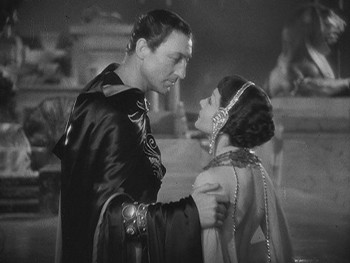 | 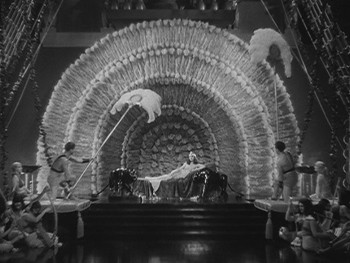 |
DeMille, completely in his element, knows exactly where to focus attention regarding this power structure, and does so magnificently with Claudette Colbert. Occurring the same year as her unexpected Best Actress win for It Happened One Night, she adds a slightly quirky allure to the character that makes it nearly impossible for the audience to resist her charm. She makes her wooing advances an entertaining, pleasant thing to watch, never dipping too far into vaudeville-inspired cheekiness to detract from the scene but never taking it too seriously to make it feel stiff. There's a certain "eat, drink, and be merry" demeanor about her whims that could get lost in trying to give the film a dramatic poise, but not in DeMille's hands. Colbert's stunning to watch as Cleopatra, both in her dramatic scenes and in her lighthearted moments.
She's almost the most stunning thing about the whole shebang, coming in right behind DeMille's signature lavish production concepts. Victor Milner won an Oscar for his cinematography in '34 for Cleopatra, and rightfully so; a big part of soaking in the film is rooted in bouncing the audience's attention from one stunning element to the next. The art deco set design in particular is enough to make modern designers quake in their boots, showcasing both lavishness and attention to detail in a way that bombards the viewer with intricate Egyptian and Roman design elements without feeling too overdone.
Intricate costume designs etch out its signature personality even further, especially Travis Banton's work draped over Cleopatra herself. Though her gold-encrusted gowns and headdresses are awe-inspiring, it's the incorporation of jet black into the grayscale image that really trumpets visual allure. But, more than that, her costumes are also surprisingly risqué for the time period, projecting designs that accentuate her form in ways that stay truthful to the open-airiness about Egyptian attire and remaining, just a pinch, on the provocative side. Claudette wears these garments with so much authenticity and gravitas that it really makes us grasp how she'd be able to swoon her way into grasping victory in testosterone-powered political endeavors.
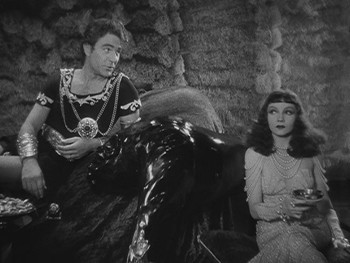 | 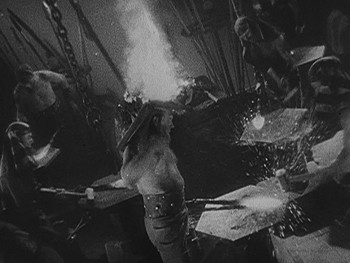 |
As to be expected, Colbert's initial scene as Cleopatra wooing Marc Antony is a stunner. It's in this that DeMille almost works as the ring leader in a circus instead of as a legendary director. Before the eyes of two alcohol-infused and starkly different historical figures in the midst of a power play, he parades a pack of women mimicking the movements of cats and a stalwart pair of chiseled assistants supporting their dining table on their shoulders. It's a lengthy scene, one that aims to put both the audience in Marc Antony's seat as his metaphorical armor comes crashing down via an onslaught of jewels, maidens, and ego-stroking from one of the world's most powerful women. And it works.
Herein lays the challenge. Cleopatra has three focal points: the character herself, the lavishness revolving around her presence, and the men in her life swooned by her magnetism. It seems like each director that tries to tackle the story doesn't really know what to do with all-powerful yet easily-swooned men, and DeMille's Cleopatra is no exception -- though they're handled well enough to hold concentration. Essentially, they're lowered to the levels of pawns underneath Cleopatra's fingertips, which make it difficult to really buy into them being strong individuals since the entire story swings on their manipulation. Warren William and Henry Wilcoxon both present Caesar and Marc Antony with the right sort of gusto while upstaging other men, yet they both skew towards awkwardness once their temptress enters the room. As with most things revolving around DeMille's cinematic eye, both are visual spitting images to historical depictions (especially Warren William, who appears to be a near spitting image of Caesar) even if their projections aren't quite there.
Be that as it may, Cleopatra embodies the director's spectacular screen presence -- something that escalates further as treachery, war, and spurned love seep into the picture -- in a way that greatly overshadows its stumbles to become an enduring portrait of an oft-misrepresented historical figure. In the tradition of some of his more prolific works such as Ten Commandments or The King of Kings, firmly rooted in excellence with historical epics, it becomes an event picture that truly understands the mentality revolving around ancient extravagance. Cleopatra, more than anything, knew how to push buttons to get what she needed for herself and the country of Egypt, whether it be through matters of wealth or matters of the heart -- or both. DeMille's brassy style fits this attitude like a glove, which builds into a stunning film experience that hugely entertaining to behold. Is it a step-for-step mirror of Cleopatra's history? Nah, not really, but in DeMille's hands ... who cares?
The DVD:

As an entry into Universal's Backlot Series, Cleopatra comes in a standard keepcase presentation with a sturdy, shiny cardboard slipcover holding the case. Inside, you'll find three lobby cards printed with classic posters for the film.
Video and Audio:
Preserved by the UCLA Film and Televison Archive, Universal's transfer for Cleopatra wears its age extremely well -- though clearly evident. Plenty of print damage can clearly be seen in the film's 1.33:1 full-frame presentation, both in minute scratches and in full-length line damage, as well as compression artifacts that give it a processed look. Some blooming can also be seen against stark whites, as well as some edge enhancement lines that crop up in scenes dense with texture. However, that's just part of dealing with some older prints; when it comes to depth, dimensionality, and overall contrast levels, the image looks rather good.
Grayscale linearization is handled well, opening the door for some rather strong details to pop from the image. And, boy, there's a load of minute elements to soak in. As yapped about in the film review, the production design and costume work here is an intricate array of decadence. Little points, like the slight glistening on Cleopatra's metallic headdresses and the shifting sheen against beautiful statues of both Roman and Egyptian origin, showcase both the print and the transfer's highest qualities. Even distanced elements can be cleanly seen in many sequences, like the statues at the end of the dense hallway behind Marc Antony as he enters Cleopatra's lair. It's certainly not a perfect transfer or an ideal print to replicate, but it's a very pleasant and enjoyable presentation that does justice to DeMille's visual extravagance. It's worth noting that the title cards at the beginning of the film are windowboxed.
Defaulting to a two-channel sound design, the Mono track has its period-placed issues here and there -- but largely sounds decent enough. Verbal clarity doesn't really waver, though it does push on the shelves with a bit of a rasp like many tracks of its time. Musical accompaniment also sounds fine, though sporting some of the same issues as the dialogue. However, no obtrusive blips or distortions could be detected, certainly not enough to derail enjoyment of the film. It serves its purpose, remaining audible and matching well with the image. A Spanish 2.0 track is also available, along with subtitles in both English, Spanish, and French.
Special Features:
Commentary with Filmmaker F.X. Feeney:
Staying focused and highly insightful, F.X. Feenery offers a well-spaced commentary that focuses mostly on filmmaking aspects. He discusses transitions, the usage of "plain" language to make the character's human, and DeMille's focus on sensuality and fiery women as the perfect fit for Cleopatra. His content is, in gereal, very strong, but Feeney's at his most insightful during the pinnacle scene with Cleopatra and Marc Antony.
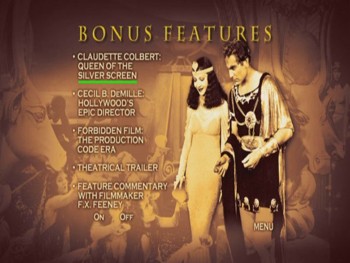 |
Featuring interviews with several film historians and writers as well as splicing in footage from some of her other films, this featurette gives us the bones, bits, and pieces of Claudette Colbert's relationship with movies, with DeMille, and with 1934 as the year that would become one of the best of her career. It discusses her roles in DeMille's other productions, along with why her on-screen presence is so demanding of attention. Though a little praise-heavy and a bit short, the experts' nuggets of information and the infusing of archival footage and stillshots are worth the time.
C.B. DeMille: Hollywood's Epic Director (10:03, 3x2):
Along the same lines as the Colbert featurette, this one covers C.B. DeMille's career as it transitioned from the Silent to the Production Code era. It discusses how he projects the stereotypical director with megaphone and seat on-set, his dated work in the '20s, and his transition to talkies around the shift. Like the first featurette, it's a bit of a backslapper but still very worthwhile for the content that inks through from the experts.
Production Code Era (9:47, 3x2):
For those inundated to the Production Code or "Pre-Code" Hollywood, this is a nice overview of how it came to pass. It covers how individual states had different censorship issues and how they combated the situation with a central editing board, a move that was more fueled by monetary losses than on the content displayed. It discusses how it applies to the Depression as well, which is pretty interesting, as well as how directors like DeMille got around code issues.
Rounding out the supplemental material is a Theatrical Trailer (4:16, 3x2) that likely shows the condition of some of the print elements before UCLA Film Archive's preservation.
Final Thoughts:
As a lover of ancient Egyptian culture and concepts, it'd be near impossible for me to not appreciate Cleopatra on at least some level. However, that's actually a pretty small element to the film itself, whereas Claudette Colbert's outstanding stage presence and DeMille's intoxicating eye for visual mastery within the collision of Egyptian and Roman elements stand out much more. It comes together into an amazing spectacle of cinematography prowess and entertaining theatrics, showcasing the director's creative tricks around the Production Code era as involving and enjoyable elements. To this day, it's still the most pleasing concoction of Cleopatra's story -- though Hollywood's certainly ready for another entry with a bit of modern Hollywood polish. Universal's Backlot Series edition of Cleopatra presents the material with highly watchable visual and sound qualities, as well as a nice commentary and roster of featurettes to enjoy afterwards. Highly Recommended.
|
| Popular Reviews |
| Sponsored Links |
|
|
| Sponsored Links |
|
|
| Release List | Reviews | Shop | Newsletter | Forum | DVD Giveaways | Blu-Ray | Advertise |
|
Copyright 2024 DVDTalk.com All Rights Reserved. Legal Info, Privacy Policy, Terms of Use,
Manage Preferences,
Your Privacy Choices | |||||||













